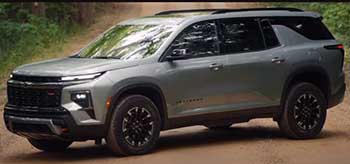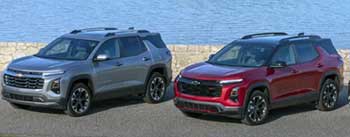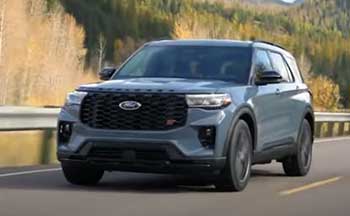
As a car enthusiast who’s spent time behind the wheel of both the 2025 Ford Explorer and Chevrolet Equinox, I’m here to share my firsthand insights on these two SUVs.
My goal is to help you decide which one suits your lifestyle by breaking down their strengths, weaknesses, and key features in a conversational, real-world way.
Whether you’re after a family-friendly ride, a fuel-sipper for daily commutes, or a powerful SUV for adventures, this article compares the Explorer and Equinox across performance, comfort, technology, and value to guide your choice.
Comparison Table
| Feature | 2025 Chevrolet Equinox | 2025 Ford Explorer |
|---|---|---|
| Starting MSRP | $29,995 | $41,745 |
| Engine | 1.5L Turbo 4-cylinder (175 hp, 203 lb-ft) | 2.3L Turbo 4-cylinder (300 hp, 310 lb-ft) |
| Fuel Economy (Combined) | 27 mpg (FWD), 26 mpg (AWD) | 24 mpg (RWD), 23 mpg (AWD) |
| Seating Capacity | 5 | Up to 7 |
| Cargo Space (Behind 2nd Row) | 29.9 cu. ft. | 47.9 cu. ft. |
| Infotainment Screen | 11.3-inch touchscreen | 13.2-inch touchscreen |
| Standard Safety Features | Forward collision alert, lane-keep assist, blind-spot monitoring | Ford Co-Pilot360 (blind-spot monitoring, lane-keeping, auto high-beams) |
| Towing Capacity | 1,500 lbs | Up to 5,600 lbs |
| Warranty | 3 yr/60,000 km comprehensive, 5 yr/100,000 km powertrain | 3 yr/60,000 km comprehensive, 5 yr/100,000 km powertrain |
My Experience With the Chevrolet Equinox
I recently spent a week driving the 2025 Chevrolet Equinox LT around town and on a short road trip. Its compact size immediately stood out, making it a breeze to navigate city streets and squeeze into tight parking spots. The Equinox’s 1.5-liter turbocharged engine, pumping out 175 horsepower, felt peppy enough for daily driving, though it didn’t exactly pin me back in my seat. The cabin was surprisingly roomy for a compact SUV, with comfortable seats and a clean, intuitive layout. The 11.3-inch touchscreen was a highlight, responding quickly and pairing seamlessly with my phone via wireless Apple CarPlay.
On the highway, the Equinox was smooth and quiet, with a suspension that soaked up bumps better than I expected. Fuel economy was a pleasant surprise—hitting close to the EPA’s 27 mpg combined in my mixed driving. However, I noticed the engine strained a bit when merging onto fast-moving freeways, especially with a full load of passengers. The cargo space, at 29.9 cubic feet, was decent but not class-leading, and I wished the rear seats could slide for more flexibility. Safety features like lane-keep assist and automatic emergency braking worked well, giving me confidence in heavy traffic. Overall, the Equinox felt like a practical, budget-friendly choice for solo drivers or small families who prioritize efficiency and ease of use.
My Experience With the Ford Explorer
I took the 2025 Ford Explorer ST-Line for a spin over a weekend, and it’s a different beast compared to the Equinox. This midsize, three-row SUV felt commanding on the road, with its 2.3-liter turbo engine delivering a robust 300 horsepower. Acceleration was brisk, and the 10-speed automatic transmission shifted smoothly, making highway merges effortless. The spacious cabin, with room for seven, was a hit for my family road trip, and the 47.9 cubic feet of cargo space easily swallowed our gear. The 13.2-inch touchscreen was a standout, though it took me a bit to navigate its menus.
Off-road, the Explorer’s available 4WD and hill descent control gave me confidence on a gravel trail, but its fuel economy (24 mpg combined) was noticeably thirstier than the Equinox. The ride was comfortable, but the sheer size (198.8 inches long) made parking trickier in tight spaces. Ford’s Co-Pilot360 safety suite, with features like blind-spot monitoring and auto high-beams, performed reliably, though some advanced options like BlueCruise were reserved for higher trims. The Explorer shines for families needing space and power but comes at a premium price.
Pros Of the Chevrolet Equinox

- Affordable Price Point: Starting at $29,995, the Equinox is significantly cheaper than the Explorer, making it accessible for budget-conscious buyers.
- Fuel Efficiency: With 27 mpg combined (FWD), it’s a cost-saver for daily commutes or long trips, outpacing the Explorer’s 24 mpg.
- Compact Maneuverability: Its smaller size (183.2 inches long, 72.6 inches wide) makes parking and city driving a breeze compared to bulkier SUVs.
- User-Friendly Infotainment: The 11.3-inch touchscreen is responsive, with crisp graphics and standard wireless Apple CarPlay and Android Auto.
- Comprehensive Safety Suite: Standard features like forward collision alert, blind-spot monitoring, and traffic sign recognition provide peace of mind.
- Customization Options: Packages like the Midnight Edition add stylish touches like 18-inch gloss black wheels and dark accents.
- Smooth Ride Quality: The suspension handles bumps well, offering a comfortable ride for both city and highway driving.
Also read: My Thoughts on Ford Edge Vs. Hyundai Tucson.
Cons Of the Chevrolet Equinox
- Underpowered Engine: The 1.5-liter engine’s 175 horsepower feels sluggish when fully loaded or during quick acceleration.
- Limited Cargo Space: With 29.9 cubic feet behind the second row, it trails competitors like the Honda CR-V in storage capacity.
- No Sliding Rear Seats: Unlike some rivals, the Equinox lacks a sliding second row, reducing cargo and passenger flexibility.
- Basic Interior Materials: Hard plastics in the cabin feel less premium, especially in higher trims where you expect better quality.
- Fewer Airbags: With six airbags compared to the Explorer’s eight, it offers slightly less crash protection.
- Modest Towing Capacity: At 1,500 pounds, it’s not ideal for towing trailers or heavy loads.
- Limited High-End Features: Advanced tech like adaptive cruise control isn’t standard and requires pricier trims or packages.
Maintenance Tips For the Chevrolet Equinox

- Regular Oil Changes: Use synthetic 5W-30 oil and change it every 7,500 miles to keep the 1.5-liter turbo engine running smoothly.
- Tire Rotations: Rotate tires every 6,000–8,000 miles to ensure even wear, especially if you opt for AWD models.
- Brake Inspections: Check brake pads every 20,000 miles, as city driving can wear them faster in a compact SUV.
- Air Filter Replacement: Swap the engine air filter every 15,000–20,000 miles to maintain fuel efficiency and engine performance.
- Transmission Fluid: Flush and replace the six-speed automatic’s fluid every 50,000 miles to prevent shifting issues.
- Battery Checks: Inspect the battery annually, especially in cold climates, to avoid starting problems.
- Software Updates: Keep the infotainment system updated at your dealership to ensure compatibility with Apple CarPlay and Android Auto.
- Coolant Maintenance: Check coolant levels every 30,000 miles to protect the engine from overheating.
Comparison With Other Brands
- Honda CR-V: Offers more cargo space (39.3 cu. ft.) and a sliding rear seat, but its base price is slightly higher at $31,000.
- Toyota RAV4: Matches the Equinox’s fuel efficiency (27–28 mpg) but has a more refined interior; however, its base engine feels less responsive.
- Nissan Rogue: Provides similar safety features and a competitive price ($30,500), but its CVT transmission can feel less engaging.
- Hyundai Tucson: Boasts a modern design and more standard tech, like a 10.25-inch screen, but its base engine has less torque (181 lb-ft).
- Mazda CX-5: Delivers a sportier drive and premium cabin, but its 25 mpg combined lags behind the Equinox’s efficiency.
- Kia Sportage: Offers a longer warranty (5 yr/60,000 miles comprehensive) and bold styling, but its base trim lacks some of the Equinox’s safety features.
- Subaru Forester: Excels in AWD performance for off-road use, but its interior feels dated compared to the Equinox’s modern infotainment.
Pros Of the Ford Explorer
- Powerful Engine Options: The base 2.3-liter turbo (300 hp) and optional 3.0-liter V6 (400 hp) offer thrilling performance.
- Spacious Interior: With 87.8 cubic feet of cargo space (seats folded) and three rows, it’s ideal for large families or road trips.
- Impressive Towing Capacity: Up to 5,600 pounds, perfect for trailers, boats, or campers.
- Advanced Safety Features: Ford Co-Pilot360 includes blind-spot monitoring, lane-keeping, and cross-traffic alert as standard.
- Large Infotainment Screen: The 13.2-inch touchscreen is vibrant, with an optional Bang & Olufsen sound system for audiophiles.
- Versatile Drivetrain: Available RWD or 4WD, plus hill descent control, makes it capable on varied terrains.
- Top Safety Ratings: Earns a 5-star NHTSA overall rating, with eight airbags for added protection.
Read more: My Thoughts on GMC Terrain Vs. Ford Escape.
Cons Of the Ford Explorer
- Higher Price Tag: Starts at $41,745, a steep jump over the Equinox, which may stretch budgets.
- Lower Fuel Economy: At 24 mpg (RWD), it’s less efficient, especially with the V6’s 21 mpg.
- Bulky Size: Its 198.8-inch length and 78.9-inch width make it harder to maneuver in tight spaces.
- Premium Fuel for Some Trims: Higher trims like ST and Platinum require pricier premium gasoline.
- Complex Infotainment: The 13.2-inch system can feel overwhelming, with menus that aren’t as intuitive as the Equinox’s.
- Expensive Optional Packages: Features like BlueCruise and adaptive cruise control are locked behind costly trims.
- Slightly Higher Depreciation: Loses 47.6% of its value over five years, compared to the Equinox’s 45.2%.
Maintenance Tips For the Ford Explorer
- Oil Changes: Use 5W-30 synthetic oil, changing every 7,500–10,000 miles to maintain the turbo engine’s health.
- Tire Maintenance: Rotate tires every 7,500 miles and check alignment, as the Explorer’s weight can cause uneven wear.
- Brake System: Inspect brake pads every 25,000 miles, especially if towing, to ensure stopping power.
- Transmission Care: Service the 10-speed automatic every 60,000 miles to avoid shifting issues.
- Coolant Checks: Monitor coolant levels every 30,000 miles to prevent overheating, especially with the V6 engine.
- Battery Maintenance: Test the battery annually, as the Explorer’s tech-heavy features can strain it.
- Software Updates: Update the Ford Co-Pilot360 system at dealership visits to keep safety features sharp.
- Air Filter: Replace the engine air filter every 20,000 miles to optimize performance and fuel economy.
Comparison With Other Brands
- Jeep Grand Cherokee: Offers similar towing (6,200 lbs) and off-road capability but has a higher starting price ($42,000).
- Toyota Highlander: Matches the Explorer’s three-row seating but has less horsepower (265 hp) and cargo space.
- Honda Pilot: Provides a smooth ride and 41.0 cu. ft. of cargo space but lacks the Explorer’s towing prowess.
- Dodge Durango: Boasts a powerful V8 option (475 hp) but guzzles fuel at 17 mpg combined.
- Kia Telluride: Offers a premium interior and 10-year warranty but tops out at 3,500 lbs towing.
- Hyundai Palisade: Similar to the Telluride with a upscale cabin but less off-road capability than the Explorer.
- Chevrolet Traverse: Closer in size to the Explorer, with 98.2 cu. ft. cargo space, but its V6 (310 hp) feels less dynamic.
Frequently Asked Questions (FAQ)
The Honda CR-V often edges out the Equinox with more cargo space, a refined interior, and a hybrid option for better efficiency.
The Explorer’s higher price, lower fuel economy, bulky size, and complex infotainment system are its main drawbacks.
The Chevrolet Traverse is closer to the Explorer, offering three-row seating, similar cargo space, and a V6 engine.
The Kia Telluride stands out with its upscale interior, longer warranty, and balanced ride, though it tows less.
Conclusion: For the Ford Explorer and Chevrolet Equinox
You’re now equipped with a clear picture of how the 2025 Ford Explorer and Chevrolet Equinox stack up. If you need a compact, budget-friendly SUV with great fuel economy and easy handling, the Equinox is your go-to.
It’s perfect for small families or urban dwellers who value affordability and simplicity. But if you’re after a spacious, powerful midsize SUV for bigger families or towing, the Explorer delivers with its robust engines and versatile interior.
Your choice depends on your priorities—efficiency and cost with the Equinox, or space and performance with the Explorer. Test drive both to feel which one fits your life best.

